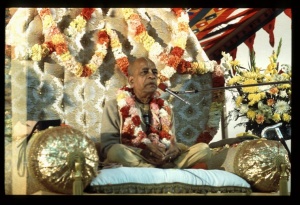SB 4.16.13: Difference between revisions
m (1 revision(s)) |
(Vanibot #0018 edit: make synonym terms in Sanskrit italic in SB - Vanisource) |
||
| Line 1: | Line 1: | ||
{{info | {{info | ||
|speaker=professional reciters | |speaker=professional reciters | ||
|listener=King | |listener=King Pṛthu | ||
}} | }} | ||
[[Category:Srimad-Bhagavatam - Canto 04 Chapter 16]] | |||
[[Category:Bhagavatam Verses Spoken by the Professional Reciters - Vanisource|041613]] | |||
<div style="float:left">'''[[Srimad-Bhagavatam]] - [[SB 4|Fourth Canto]] - [[SB 4.16: Praise of King Prthu by the Professional Reciters|Chapter 16: Praise of King Pṛthu by the Professional Reciters]]'''</div> | |||
<div style="float:right">[[File:Go-previous.png|link=SB 4.16.12]] '''[[SB 4.16.12]] - [[SB 4.16.14]]''' [[File:Go-next.png|link=SB 4.16.14]]</div> | |||
{{RandomImage}} | |||
==== TEXT 13 ==== | ==== TEXT 13 ==== | ||
<div | <div class="verse"> | ||
nādaṇḍyaṁ daṇḍayaty eṣa | :nādaṇḍyaṁ daṇḍayaty eṣa | ||
sutam ātma-dviṣām api | :sutam ātma-dviṣām api | ||
daṇḍayaty ātmajam api | :daṇḍayaty ātmajam api | ||
daṇḍyaṁ dharma-pathe sthitaḥ | :daṇḍyaṁ dharma-pathe sthitaḥ | ||
</div> | </div> | ||
| Line 16: | Line 22: | ||
==== SYNONYMS ==== | ==== SYNONYMS ==== | ||
<div | <div class="synonyms"> | ||
''na''—not; ''adaṇḍyam''—not punishable; ''daṇḍayati''—punishes; ''eṣaḥ''—this King; ''sutam''—the son; ''ātma-dviṣām''—of his enemies; ''api''—even; ''daṇḍayati''—he punishes; ''ātma-jam''—his own son; ''api''—even; ''daṇḍyam''—punishable; ''dharma-pathe''—on the path of piety; ''sthitaḥ''—being situated. | |||
</div> | </div> | ||
| Line 23: | Line 29: | ||
==== TRANSLATION ==== | ==== TRANSLATION ==== | ||
<div | <div class="translation"> | ||
Since this King will always remain on the path of piety, he will be neutral to both his son and the son of his enemy. If the son of his enemy is not punishable, he will not punish him, but if his own son is punishable, he will immediately punish him. | Since this King will always remain on the path of piety, he will be neutral to both his son and the son of his enemy. If the son of his enemy is not punishable, he will not punish him, but if his own son is punishable, he will immediately punish him. | ||
</div> | </div> | ||
| Line 30: | Line 36: | ||
==== PURPORT ==== | ==== PURPORT ==== | ||
<div | <div class="purport"> | ||
These are the characteristics of an impartial ruler. It is the duty of a ruler to punish the criminal and give protection to the innocent. King Pṛthu was so neutral that if his own son were punishable, he would not hesitate to punish him. On the other hand, if the son of his enemy were innocent, he would not engage in some intrigue in order to punish him. | These are the characteristics of an impartial ruler. It is the duty of a ruler to punish the criminal and give protection to the innocent. King Pṛthu was so neutral that if his own son were punishable, he would not hesitate to punish him. On the other hand, if the son of his enemy were innocent, he would not engage in some intrigue in order to punish him. | ||
</div> | </div> | ||
__NOTOC__ | |||
<div style="float:right; clear:both;">[[File:Go-previous.png|link=SB 4.16.12]] '''[[SB 4.16.12]] - [[SB 4.16.14]]''' [[File:Go-next.png|link=SB 4.16.14]]</div> | |||
__NOTOC__ | |||
__NOEDITSECTION__ | |||
Revision as of 22:20, 30 November 2017

A.C. Bhaktivedanta Swami Prabhupada
TEXT 13
- nādaṇḍyaṁ daṇḍayaty eṣa
- sutam ātma-dviṣām api
- daṇḍayaty ātmajam api
- daṇḍyaṁ dharma-pathe sthitaḥ
SYNONYMS
na—not; adaṇḍyam—not punishable; daṇḍayati—punishes; eṣaḥ—this King; sutam—the son; ātma-dviṣām—of his enemies; api—even; daṇḍayati—he punishes; ātma-jam—his own son; api—even; daṇḍyam—punishable; dharma-pathe—on the path of piety; sthitaḥ—being situated.
TRANSLATION
Since this King will always remain on the path of piety, he will be neutral to both his son and the son of his enemy. If the son of his enemy is not punishable, he will not punish him, but if his own son is punishable, he will immediately punish him.
PURPORT
These are the characteristics of an impartial ruler. It is the duty of a ruler to punish the criminal and give protection to the innocent. King Pṛthu was so neutral that if his own son were punishable, he would not hesitate to punish him. On the other hand, if the son of his enemy were innocent, he would not engage in some intrigue in order to punish him.